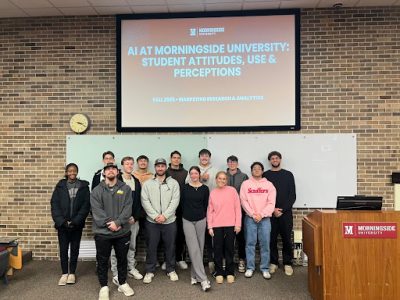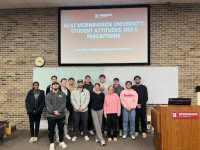By Lindsey Smith–The United Methodist Church(UMC) is no longer so united after a decision by the Special General Conference 2019 delegates to reject same-sex marriage and LGBTQ+ pastors in their church.

The decision to follow what is known as the Traditional Plan is widely being criticized by those in the church (clergy, churchgoers, etc.) as well as those outside of it.
Krista Waite, a senior at Morningside College and the Interim Director of Children’s Education at Grace United Methodist Church, is deeply troubled by the news, even tearing up during the panel discussion of the events held on Thursday night.
She says, “This has been really hard for me. It breaks my heart just listening to the faith, the religion you grew up with going through so much.”
This news hasn’t just been hard for students. It’s weighing heavily on the minds of professors and countless clergy in the United Methodist Church (UMC), which is why religious studies assistant professor Elizabeth Coody invited several guests to host a discussion panel.
The guests included Grace UMC Rev. Jim Shirbroun, adjunct faculty member and pastor of Le Mars UMC Rev. Dr. Michel Lundula, former Morningside chaplain and retired UMC pastor Rev. Kathy Martin, and current Morningside chaplain Pastor Andy Nelson.
All were in agreement that this decision is a step backwards for the United Methodist Church.
What makes this decision so hard for the UMC in particular is that it spans worldwide, with churches in Europe, Asia, Africa, and the United States. Most United Methodists reside in the United States and are primarily older conservatives. Rev. Lundula addressed this within the panel discussion, saying “The big challenge is that we live in different cultural contexts. That issue will not stop.” He went on to describe the current state of the UMC as many different churches under one big umbrella.
As the third largest Christian denomination in the U.S., this decision could spell devastating news for unification efforts within the UMC. Before the conference was over, delegates were already discussing “gracious exits” for those congregations that disagreed with the decision or no longer felt they should be associated with the UMC.
However, the tide is turning with more progressives and young people entering the church.
Even before the general conference began, a joint statement released by the presidents of the National Association of Schools and Colleges of the United Methodist Church stated: “Embracing the United Methodist Church’s core religious and humanistic values that all persons are of sacred worth and equal standing, the 93 United Methodist (NASCUMC) affiliated colleges/universities and their respective presidents serving over 260,000 students strongly affirm access and inclusion of all students, faculty, and staff on our campuses regardless of their race, ethnicity, creed, national origin, gender, gender identity/expression, or sexual orientation.”
This statement was summarily rejected by the general conference after four days of heated discussion and is heartbreaking for many allies within the UMC.
Rev. Lundula, who is originally from Africa, spoke of his unique perspective from seeing the Methodist missionaries be welcomed by his grandparents and great grandparents in Africa, to learning and preaching Methodist teachings in America.
Because of this, Rev. Lundula remains skeptical of the current management of the general conference. He says: “I learned a lot by being a stranger all my life. Usually the general conference is a time to celebrate, but it is not that way again. Instead of celebrating what we do, it is not surprising, our general conferences have become a ground of fighting. It’s like we are not the church.”
Other panel members, like Professor Coody, addressed the statistics. Those who identify as LGBTQ+ are three times more likely to commit suicide than those who do not. When rejected by their community or organizations like the UMC, suicide becomes eight times more likely for LGBTQ+ individuals.
While many of the panel members expressed their mission to keep their lives and the doors of their specific churches open to everyone, the general conference’s hardline approach to same-sex marriage and LGBTQ+ pastors will continue to create division within the United Methodist Church, and discussions on the topic are far from over.








Leave a Reply